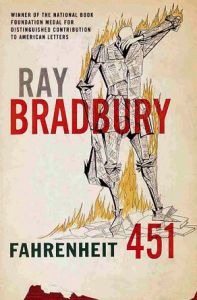If you are a fan of Ray Bradbury, you already know what this book is. If not, then perhaps I should fill you in. In the future, objective debate is considered politically incorrect. Books have been outlawed for the promotion of free thinking. Firemen in this future world do not put out fires, but instead are charged with going into people’s home searching for contraband. When they find the outlawed books, they seize them and burn them. The story follows one of these firemen named Guy Montag.
The Title Error
First, let’s point out the dual importance and meaninglessness of research shown through this work. It is important of course because the title is not actually what it was supposed to be. He intended it to be the temperature that paper will combust at. Unfortunately he confused Celsius with Fahrenheit. The title should have been Fahrenheit 842. With that in mind, it has made absolutely no negative impact on sales. If your book is good enough, maybe people will ignore the little slips in your own research as well.
What Ray Bradbury Really Meant
Moving on from there, it is generally seen as a pretty clear metaphor for censorship by the state and the dangers that it can hold. It does indeed hold a message there about such things. Unfortunately for Bradbury, that isn’t what was meant to be the message of his novel. Censorship was meant to be an element of the tale and the focus was supposed to be more about the evils of television. Take a moment to absorb that. It isn’t what comes to mind for most people as the point of the story at all. So much so that Bradbury is left in a state of severe anger more often than not by the sheer number of people who flat out refute his own intended purpose for the book as having any validity. While guest lecturing in front of a UCLA class, students argued that his book was about censorship regardless of what his intent was in writing it. The end result was that he walked out on the lecture.
To Ray Bradbury, television is a bane on society. The advent of TV was marked by a drop in interest for literature. He felt that Television was useless and compressed important information to a point of no value. Instead of details, we get factoids and it was the prime culprit in the nation’s shrinking attention spans. How this view tied to the fame he garnered from television adaptation and his own TV show is unclear. This hatred of modern devices extends even into the internet and he refuses to own a computer.
The Lessons of Fahrenheit 451
There is a lot you can take away from this book. As a writer, it has lessons about just how far off people will read your work from your intent. As a reader, it offers up a very harsh look at a future that very easily could happen. I think most of all, that it is worth noting something about the future predictions of Ray Bradbury in his writing. He has an uncanny accuracy. Ear buds, flat screens, ATM machines and many other things all appeared in his works before they appeared in the real world. Whatever his aversion to the devices and technology we love so much, one has to admit his finger has always been on the pulse of the future. Maybe we should take a long hard look at the television he loathes so much. Then again, we are all reading this on a computer.


